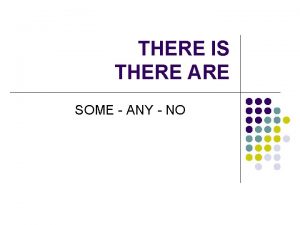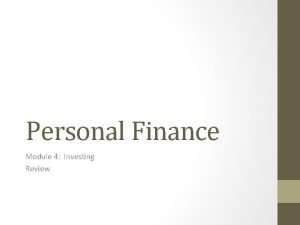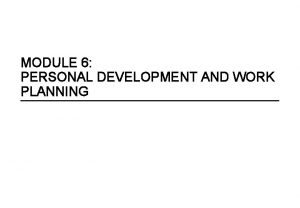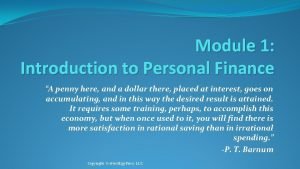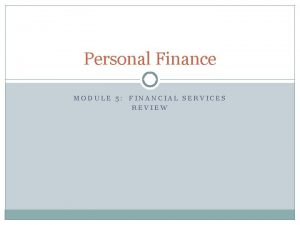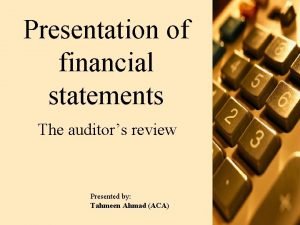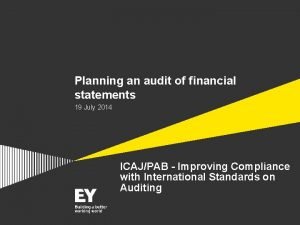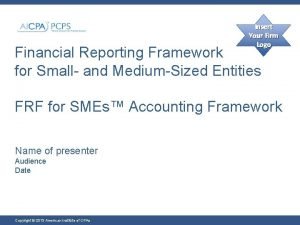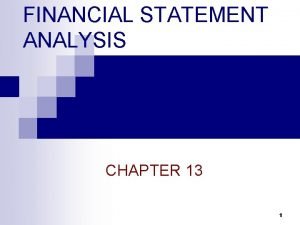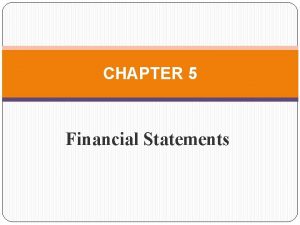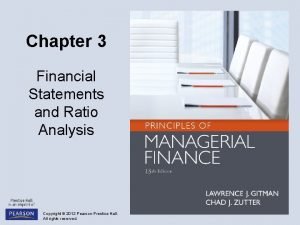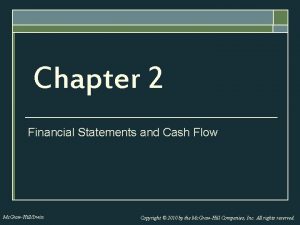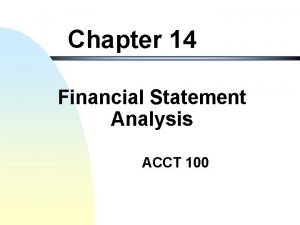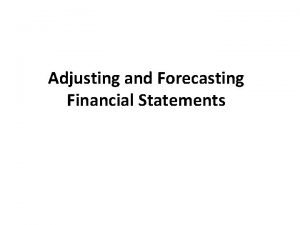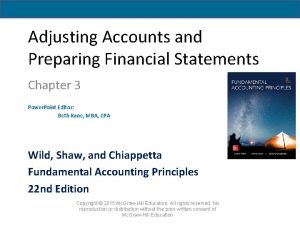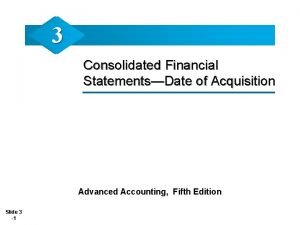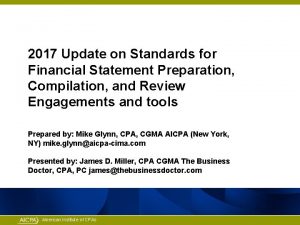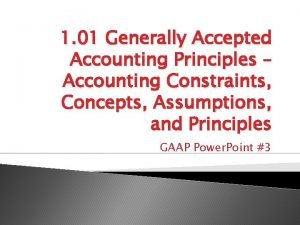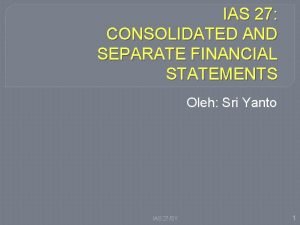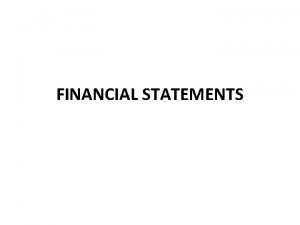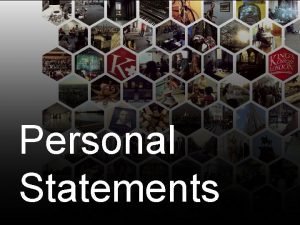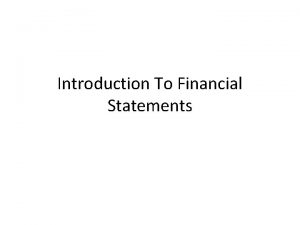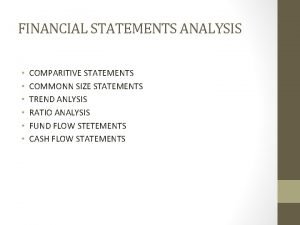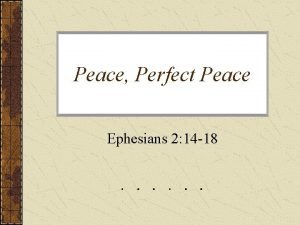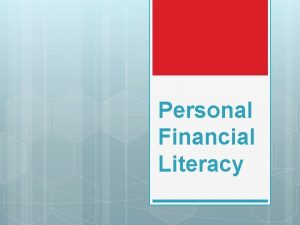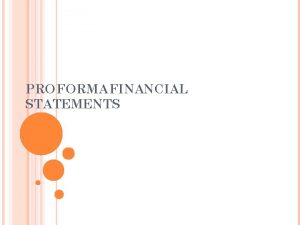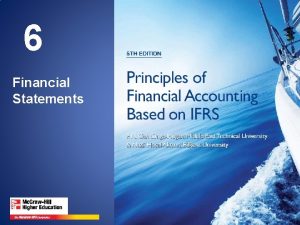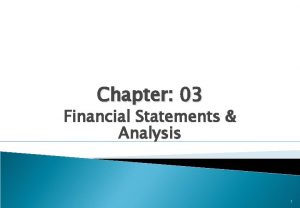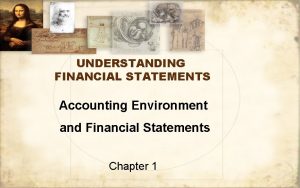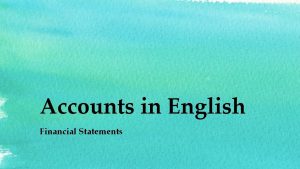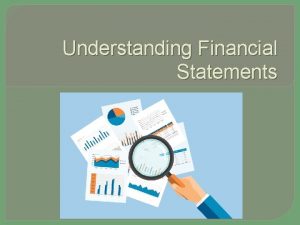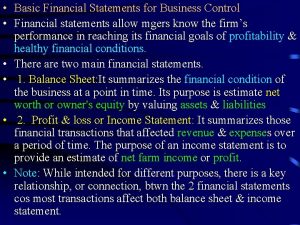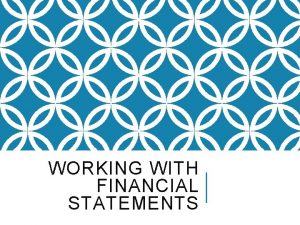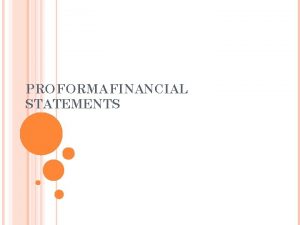Module 4 Personal Financial Statements Financial peace isnt



























- Slides: 27

Module 4 Personal Financial Statements "Financial peace isn't the acquisition of stuff. It's learning to live on less than you make, so you can give money back and have money to invest. You can't win until you do this. " -Dave Ramsey (Financial Author)

Learning Objectives �Determine the proper way to organize your financial records. �Create and understand the cash flow statement. �Create and understand a balance sheet.

Personal Financial Statements �Documents you create yourself, they are a snapshot of your financial health and allow you to judge your situation. �They show your current financial position. �Can measure your progress towards your goals. �Are often needed for taxes and when applying for credit.

Money management �Personal financial statements are starting points when it comes to understanding and implementing money management. Money management- �Day-to-day financial activities necessary to manage current personal economic resources, while working toward long-term financial security. �Daily spending and saving decisions are central to financial planning. �They must be coordinated with needs, goals, and personal situations

Question Cluster 1

Get organized �First we need to get all our important paperwork together and organized. Your financial records will be kept at home, a safety deposit box, or a computer. �A system is necessary for �Handling day to day obligations, like Paying Bills �Planning �Benchmarking your progress (Measuring your performance) �Taxes �Investing decisions �Figuring out what you can afford now and in the future

Storage Options Your Home File Your Safety Deposit Box Something as simple as a box with separators is usually sufficient at first. Home files contain current documents you will refer to often. Your home file should be organized in a way that allows you to quickly and easily access them. A safety deposit box is a private, very secure storage unit you can rent from an institution (usually your bank). Your safety deposit box should contain your most valuable and hard to replace document and items.

Records on Your Personal Computer �Purchasing, Trading, Banking, Tax preparation and more can be done conveniently from your computer. �It is important to have a Backup (or multiple backups) of any and all important documents and information. �Computers can be stolen, or broken therefore it is important to back your files up on a remote back up service. (Example: On the cloud) �Be careful what you put out there. �http: //www. bjs. gov/index. cfm? ty=tp&tid=41

Important Records �Important documents that need to be kept include: �Birth Certificates, wills, Social Security info �Personal Property and Investments �Real estate documents �Tax Forms (7 years at a minimum)

Get a shredder �Shred all documents with any personal information. �Social security and account numbers are particularly important. �Identity theft �An estimated 16. 6 million people, representing 7 percent of all persons age 16 or older in the United States, experienced at least one incident of identity theft in 2012. � http: //www. bjs. gov/content/pub/press/vit 12 pr. cfm

Throw away �Receipts for small purchases. (Example a purchase of a donut) �Non sensitive documents you no longer need.

Question Cluster 2

Balance Sheet and Cash Flow Statement �To know where your going you need to know where you are. These statements give you a summary of your current financial situation.

Balance sheet�Tells you what you have (asset) and what you owe (liabilities). �Helps us figure out our net worth for a specific point in time (ex. As of 12/31/2014). �Net Worth = Assets - Liabilities �Also called: � Net worth statement � Statement of financial position http: //www. investopedia. com/video/play/introduction-balance-sheet/

Making a Balance Sheet Step 1 – List items of value �Liquid assets- assets in cash (coins, bills) or could easily be converted to cash without losing value (Ex. Money in your checking and savings account). �Real estate-any homes or land you own, renting doesn’t count; one of the least liquid assets you can hold. �Personal possessions- A major percentage of most peoples assets (automobile, furniture, electronics, etc. ). Subject to depreciation (decrease in value) and lower liquidity. �Investment assets (Retirement accounts, Mutual Funds, etc. ) ASSIGNMENT: LIST YOUR ASSETS

There are Strings Attached – some assets can carry significant costs for maintenance and upkeep: Boats “A Boat is a hole in the water you dump money into. ” –unknown Experts say that it takes at least 10% of a boat’s value annually to cover upkeep expenses. http: //www. bloomberg. com/consumer -spending/2012 -05 -15/the-real-cost-ofowning-a-boat. html Homes Home think about: �Maintenance �Property Taxes �Mortgage Insurance �Property Insurance https: //www. usaa. com/inet/pages/advicehomeownershipcosts? akredirect=true

Making a Balance sheet Step 2 – Determine amounts owed Current liabilities- • Debts that must be paid in full in a year or less. (phone bill, utility bill, credit card payment) Long term liabilities- • Debts than will be paid full in more than a year. (student loans, car note) ASSIGNMENT: LIST YOUR LIABILITIES

Making a Balance Sheet Step 3 Compute your net worth Net worth (your wealth) = Assets + Liabilities = what you own –what you owe � Your net worth can very well be negative. Many students will have student loan liabilities that will exceed the assets they have (car, clothes, furniture). � Measurement of current financial position � No one is going to liquidate (sell, turn into cash) everything they own. What Net worth indicates is your overall current financial situation. � Net worth is not the amount of cash available for immediate spending. � If you have a net worth of $10, 000, you don’t have all that to spend. Much of that is tied up in your car, home, and other valuable personal possessions. ASSIGNMENT: COMPUTE YOUR NET WORTH

Question Cluster 3

Insolvency (Going Bankrupt) �Insolvency- is the inability to pay debts when due �Liabilities far exceed assets �Repercussions include: �Difficulty obtaining credit �Diminished future Job opportunities �Loss of Personal Assets �Strain on relationships and family �Even an individual with a very high net worth on paper can be in danger of bankruptcy. If most of your Net Worth is tied up in assets that are difficult to liquidate (an expensive home, many of your personal possessions), you may not have enough cash to pay what you currently owe.

Ways to Increase Net Worth �Increase your savings, earning, and the value of your investments. �Reduce spending Law of large numbers - look towards your largest costs. Reducing these expenses (car, apartment) will generally the largest effect on your ability to increase your net worth. Tips on how to increase your net worth: http: //www. investopedia. com/financial-edge/1212/6 -tips-for-increasing-your -net-worth. aspx

Personal Finance Ratios RATIO Debt Ratio Calculation Liabilities / net worth Example $100 in liabilities/ $150 Net Worth =. 67 This Means: What is the relationship between your debt and net worth? Low debt is best Current Ratio Liquid assets / current liabilities $ 400 in liquid assets/ $300 in current liabilities =1. 33 Do you have enough cash to pay your current bills? High is best Liquidity Ratio Liquid assets / monthly expenses $500 in liquid assets/ $250 in monthly expenses = 2 How long can you pay your bills in case of loss of income? High is best Debt-payments Ratio Monthly credit payments $100 paid towards debt a / take-home pay month/ $500 in take-home pay =. 2 How much of earnings goes to paying down your debts? Less than 20% is the general rule Savings Ratio Monthly savings /gross income $25 saved per month /$500 gross income per month =. 05 (5%) How much do you save? 5 -10% recommended (Going to depend on age, goals, life situation) Debt-To Income Ratio Recurring Monthly Debt Obligations / Gross Monthly Income $2, 000 in payments for car, home, credit card payments / $4, 500 gross income per month = 44% How much of your before-tax income are you spending to pay off loans? Less than 36% but the lower the better The simple ratios are tools for measuring your financial health. These use information found on your balance sheet. DETERMINE YOUR OWN RATIOS Try it out: Debt-to-Income Ratio (Debt / Income); are you in over your head?

Question Cluster 4

Cash Flow Statement Cash flow statement- �a summary of cash receipts and payments for a given period. �tracks how much you have coming in (inflows) vs how much you are spending (outflows) for a period of time (usually a month, 3 months, or a year). �Also called: �personal income �expenditure statement Penny wise pound foolish – when tracking your cash inflows and outflows, don’t get hung up on the small stuff. Save your mental energy for the most important decisions.

Making a Cash Flow Statement Step 1 - Record Income �Net income from employment � Also called your take home pay. How much you earn after taxes. �Discretionary Income is income left over after necessities �Savings and investment income � Includes interest earned on your savings account �Other sources* � Allowance from Parents � Scholarships � Education Grants � http: //www. investopedia. com/terms/p/personalincome. asp/

Making a Cash Flow Statement Step 2 - Record cash outflows Fixed Expense - �consistent month to month. (rent, car note, phone bill etc. ) Variable Expense - �changes month to month. (Around Christmas you’ll spend more money on gifts/ During the summer your Electric bill will often be higher) http: //awealthofcommonsense. com/wpcontent/uploads/2013/07/budget. png

Making a Cash Flow Statement Step 3 - Determine Net Cash Flow �Cash surplus or deficit = Total cash received during the time period - Cash outflows during the time period �Deficit - You can’t cover your spending needs and habits. You will be forced to use your savings or borrow to make up the difference. �Surplus - You are living within in your means. But, how do you allocate this extra cash?
 There aren't any bananas
There aren't any bananas Isnt rule
Isnt rule Isnt the love of jesus something wonderful
Isnt the love of jesus something wonderful Not being fair quotes
Not being fair quotes Isnt he beautiful
Isnt he beautiful Financialpeace.com financial snapshot
Financialpeace.com financial snapshot C device module module 1
C device module module 1 Causeway education oscar
Causeway education oscar Background of yourself example
Background of yourself example The basic rule of a risk-to-return relationship is that the
The basic rule of a risk-to-return relationship is that the Module planning exercise
Module planning exercise Personal finance module
Personal finance module Pete sets aside $50 each month
Pete sets aside $50 each month Financial plan elements
Financial plan elements Planning an audit of financial statements
Planning an audit of financial statements Sample notes to financial statements for small entities
Sample notes to financial statements for small entities Chapter 13 financial statement analysis
Chapter 13 financial statement analysis Translation of financial statements
Translation of financial statements Ethiopian government accounting
Ethiopian government accounting Chapter 3 analysis of financial statements
Chapter 3 analysis of financial statements Cash flow to creditors is equal to
Cash flow to creditors is equal to Where is preferred dividends on financial statements
Where is preferred dividends on financial statements Forecasting income statement
Forecasting income statement The expense recognition principle aims to record
The expense recognition principle aims to record Consolidated financial statements date of acquisition
Consolidated financial statements date of acquisition Ssars 21 preparation of financial statements
Ssars 21 preparation of financial statements What is accounting constraints
What is accounting constraints Ias 27
Ias 27
